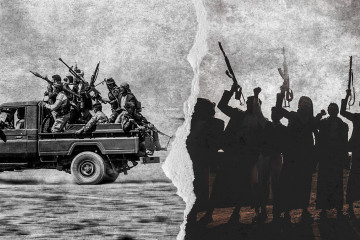
Breadcrumb

Yemen has entered the fifth month of calm, defying expectations of renewed fighting.
On 2 August, the United Nations Envoy to Yemen, Hans Grundberg, declared a two-month truce extension in the war-torn country.
For civilians who have endured seven years of fighting, displacement, and violence, the ceasefire renewal is a huge boost.
However, it is a win-lose for Yemen's warring sides: the Iran-allied Houthi group and the Saudi-backed Yemeni government.
While the truce has been advantageous to the Houthi movement’s interests, it has further eroded the legitimacy of the internationally recognised government.
Since the start of the first truce in April, for example, gains for the Houthis have far outnumbered any concessions they have made.
"While the truce has been advantageous to the Houthi movement's interests, it has further eroded the legitimacy of the internationally recognised government"
Ports under their control in Hodeida have welcomed over 20 ships carrying fuel since April, easing the energy crisis in their territories and generating millions of dollars in revenue.
Despite providing a vast financial opportunity for the group, state employees in the provinces under their control have still not been paid. Since 2016, thousands of employees in Houthi regions have not received a salary.
Another Houthi gain is the resumption of flights to Sanaa International Airport and the Yemen government's approval of Houthi-issued passports.
In 2016, the Saudi-led coalition and the Yemeni government stopped passenger planes as the airport was controlled by a militia whose authority was not recognised by numerous countries worldwide.
In May 2022, flights to Sanaa began under the UN-sponsored truce with the consent of the Houthi group. The airport's reopening has given the rebel movement a sense of victory and demonstrated regional and international powers’ growing flexibility towards them.
Moreover, as per the truce agreement, roads to Taiz city, which the Houthi group has besieged for years, were supposed to be reopened. That did not happen. Instead, the Houthis have rejected multiple UN proposals on the route’s reopening.
Many believed that the Houthi’s refusal to reopen roads to Taiz would hinder an extension of the truce, yet it was extended anyway.
As a result, the Yemeni government appears powerless in the face of Houthi defiance while UN pressure has failed to alter the group’s attitude.
|
|
When the UN envoy declared the second truce extension on 2 August, he explicitly mentioned the Taiz tragedy and the continued Houthi siege. "It is also important to make progress on opening roads in Taiz …. The people of Taiz and across Yemen deserve for the truce to deliver for them in all its aspects," he said.
Over the preceding months of relative calm, it has become clear that the Houthis have gained several advantages during the ceasefire, to the detriment of the government.
Yemen's new UN-recognised leadership, which emerged in April under the name of the Presidential Leadership Council (PLC), sparked fears about a decisive war with the Houthi group.
"The Yemeni government is still weak and incapable at the military level. If the ceasefire collapses and battles flare, the Houthis will be militarily competent and can pose a threat"
The PLC is a collection of anti-Houthi forces, and its formation curtailed infighting between the government and the southern separatists. The declared purpose of the council was to direct efforts toward countering its Houthi rivals.
But so far, the new leadership has been unable to outwit or overpower its opponent.
On 31 July, Ahmed Atia, a former Yemeni minister and a member of the legal team in the PLC, said that the council had committed to a truce while the Houthis were preparing for war.
"The [government] offered all concessions without any justification whereas the Houthis were readying themselves for a decisive battle to uproot what remains of the republican system [in Yemen]."
According to Atia, the truce is a "play" that will never truly lead to peace.
Yemeni political observers do not see any great difference between the present and former political leadership in the Yemeni government.
Abdulsalam Mohammed, the head of the Abaad Studies and Research Center, told The New Arab that the Houthis still have considerable military power.
"The Yemeni government is still weak and incapable at the military level. If the ceasefire collapses and battles flare, the Houthis will be militarily competent and can pose a threat to the government,” he said.
“The major strength of the Yemeni government is having the backing of the international community."
With the truce now extended and UN-US-led diplomatic efforts in full swing, what comes next?
Gregory D. Johnsen, a former member of the UN Panel of Experts on Yemen, envisions three scenarios, “the dream scenario, the division scenario, or the disaster scenario".
"Although it is hard to accurately predict the country's future, and which party will ultimately prevail, what is undeniable is the Houthis' rising supremacy"
He considers ending the war and uniting Yemen as a single state a far-fetched idea. This is because seven years of destructive strife have damaged the country's unity irreparably.
The division scenario refers to dividing the country into two. The northern part would be under Houthi control, while the anti-Houthi forces would run the south.
In his view, this would be "the least bad of all the options." The worst outcome would be a country fragmented into several statelets controlled by diverse warlords.
Although it is hard to accurately predict the country's future, and which party will ultimately prevail, what is undeniable is the Houthis’ rising supremacy.
Not only have they gained ground during fighting over the last eight years, but they have also reaped multiple benefits since the truce earlier this year.
The losses of Yemen's UN-recognised government, meanwhile, continue to multiply.
The writer is a Yemeni journalist, reporting from Yemen, whose identity we are protecting for their security.